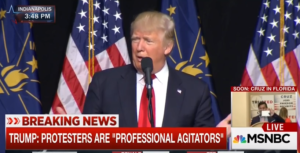
image screenshot from MSNBC video coverage of Trump rally on the media
The “best and the brightest” in academe have been trying to unravel the Trump phenomenon for about as long as this election season has run. Martin Kich of Wright State University devotes about three blogs a week to the subject on the academe blog maintained by the American Association of University Professors (AAUP).
Here’s a clue: You can only convince people that we have a good economy if they actually have jobs. A pair of scholars of fairly diverse backgrounds has figured this out: They are, of course, a minority in academe.
We have written about the phenomenon today in which more budding businesses fail than succeed. It turns out that we aren’t the only ones who noticed. “Nowadays, more businesses die each year than are started,” Angelo Codevilla writes in The Claremont Review of Books. “In this century, all net additions in employment have come from the country’s 1,500 largest corporations.”
Ah, but where are those jobs? “In the first decade of this century, U.S. multinationals shed 2.9 million U.S. jobs while increasing employment overseas by 2.4 million,” George Mason University law school professor Frank Buckley noted in a speech earlier this year at Hillsdale College’s Washington, D. C. Center for Constitutional Studies and Citizenship.
“General Electric provides a striking example,” he argued. “Jeffrey Immelt became the company’s CEO in 2001, with a mission to advance stock price. He did this in part by reducing GE’s U.S. workforce by 34,000 jobs. During the same period, the company added 25,000 jobs overseas. Ironically, President Obama chose Immelt to head his Jobs Council.”










